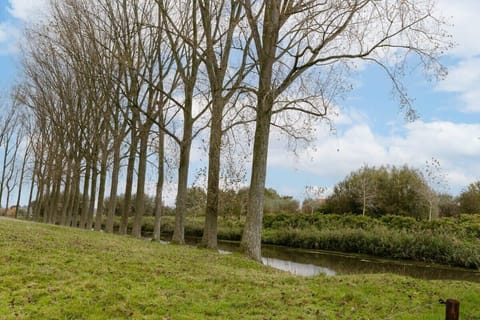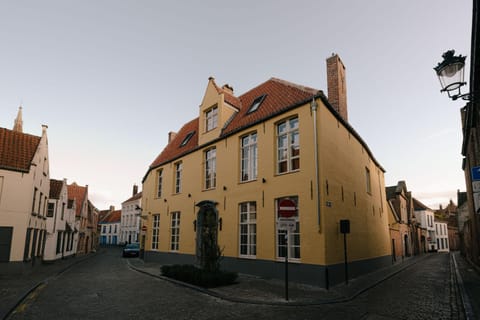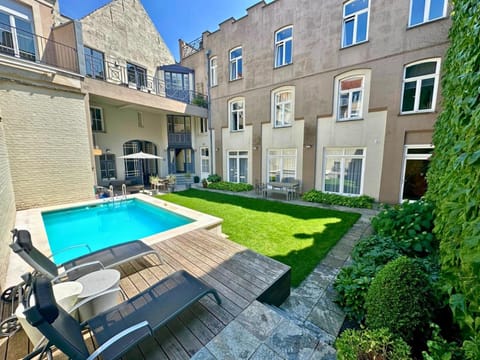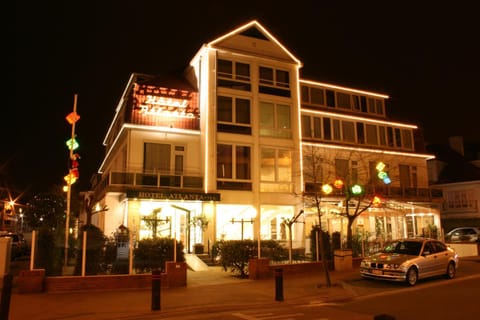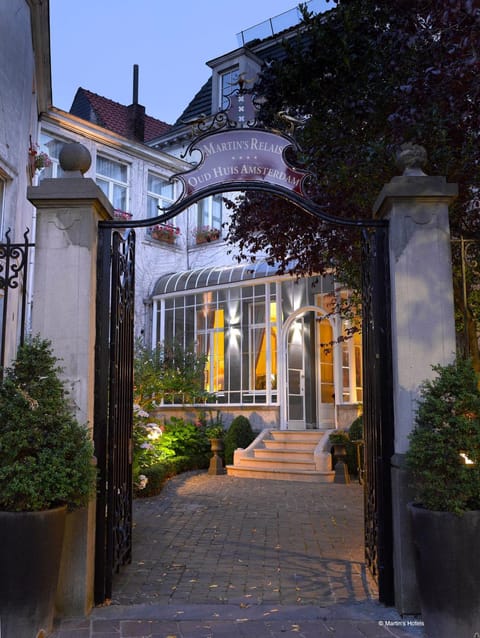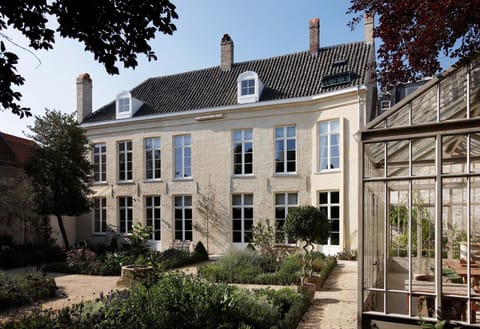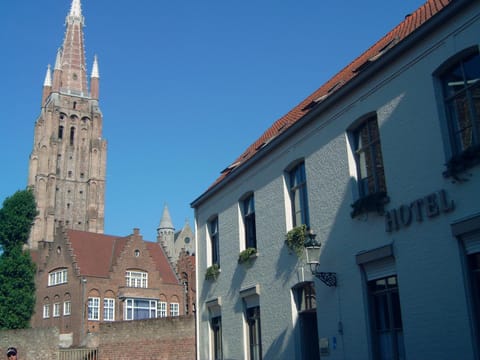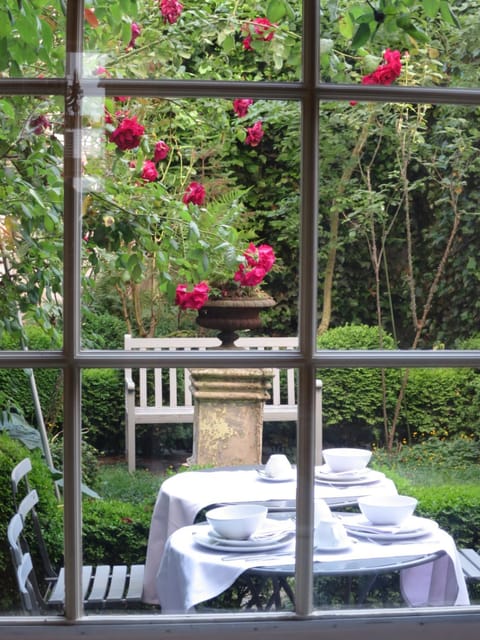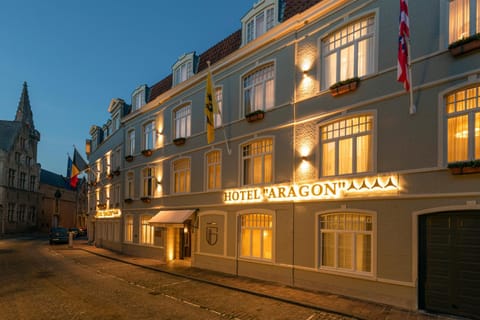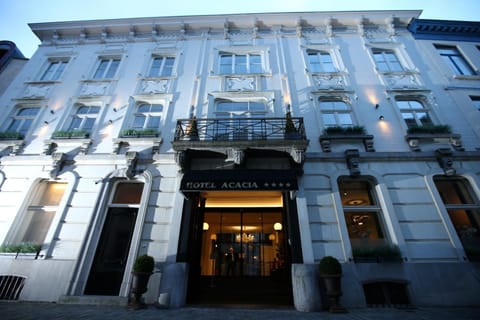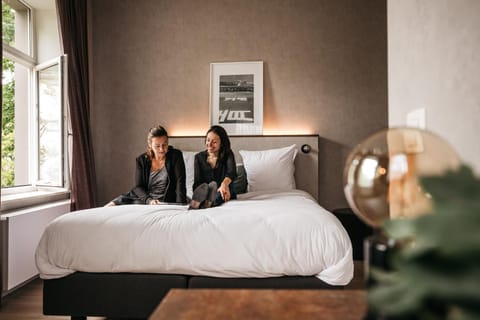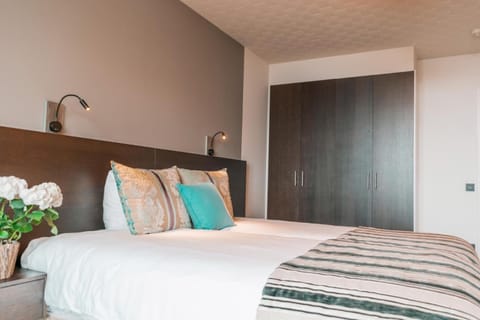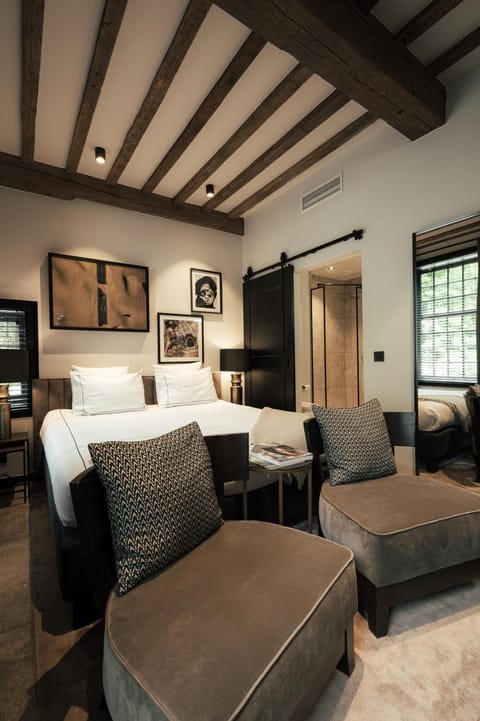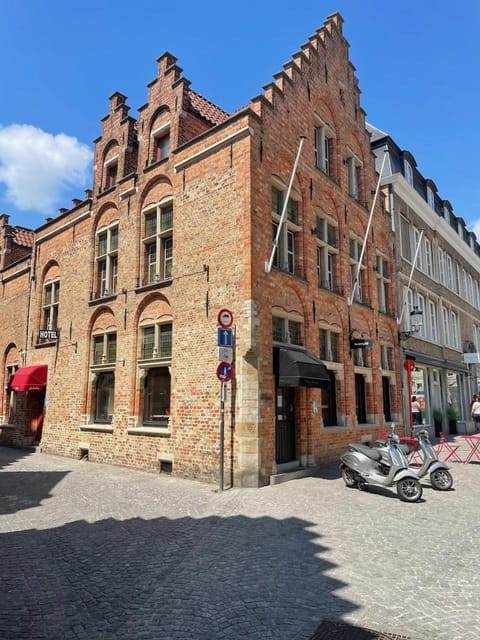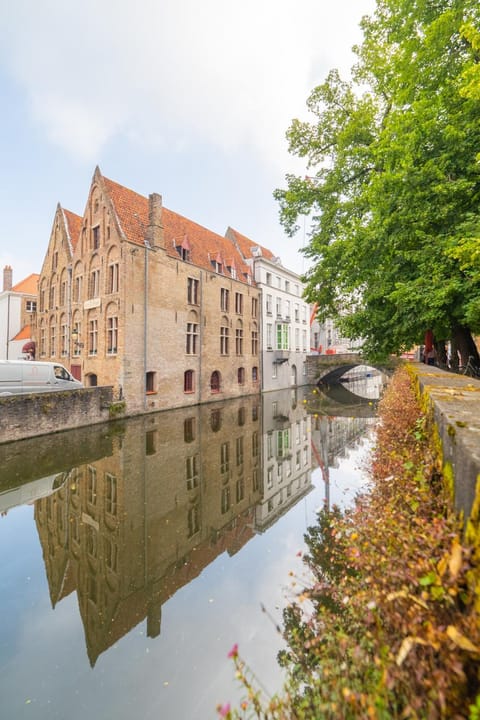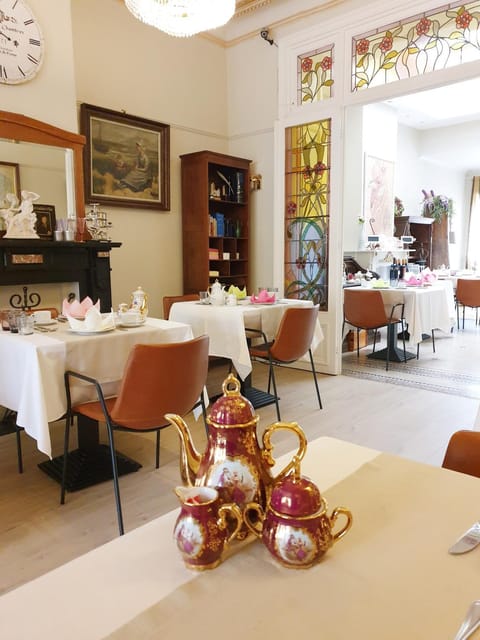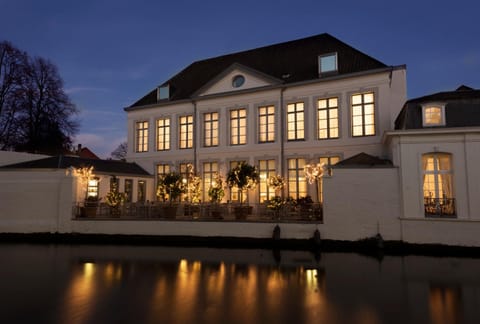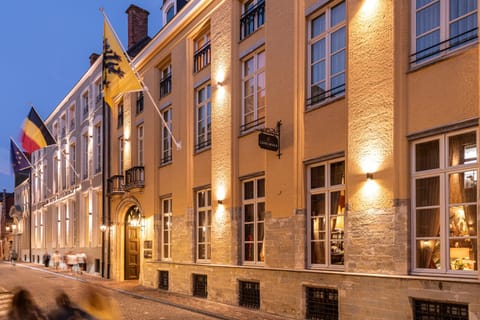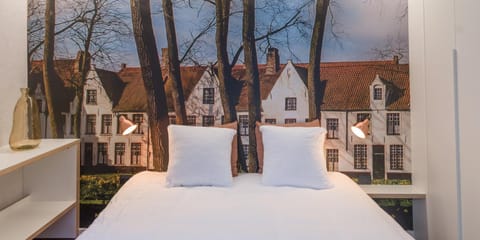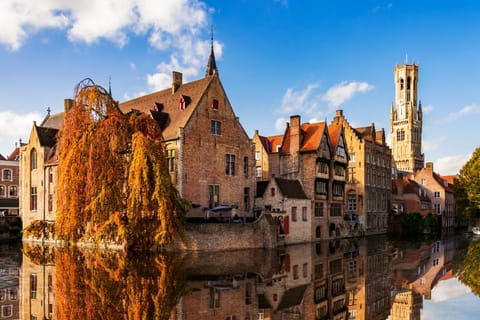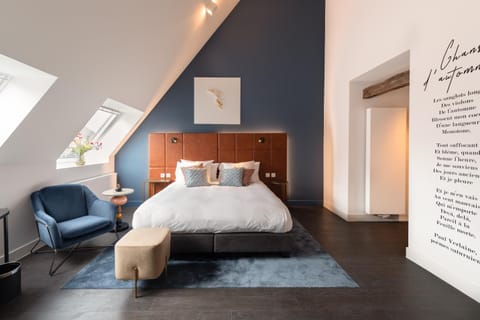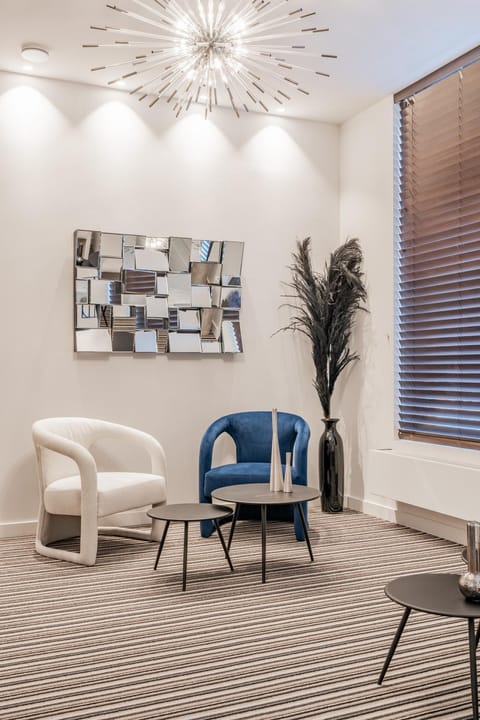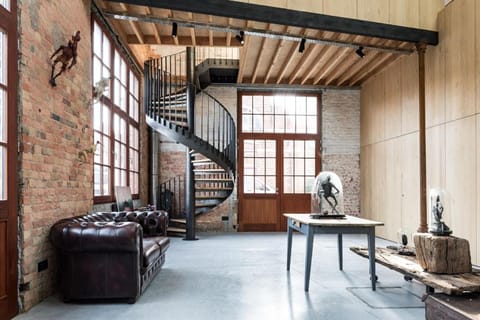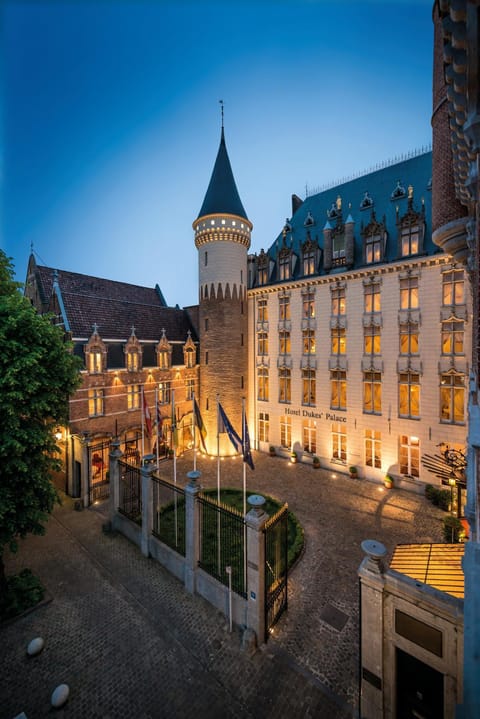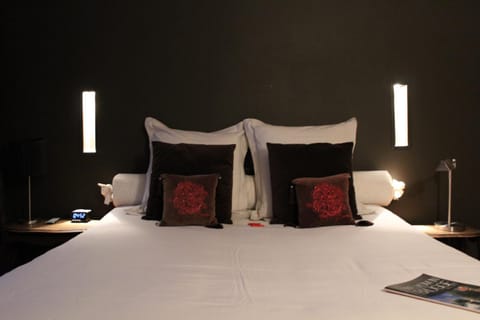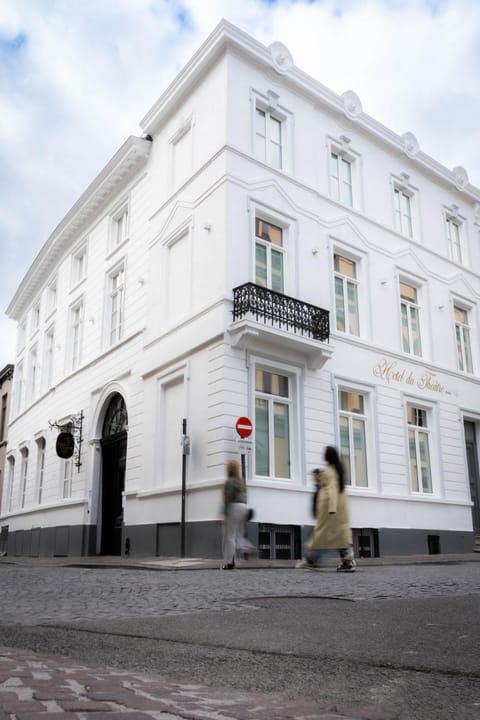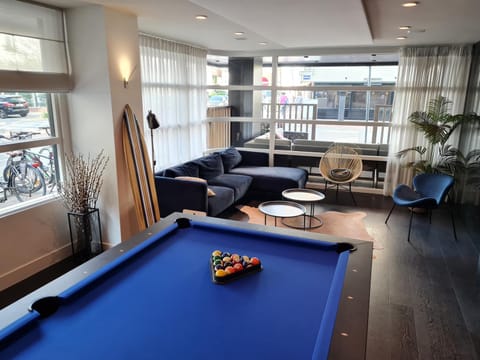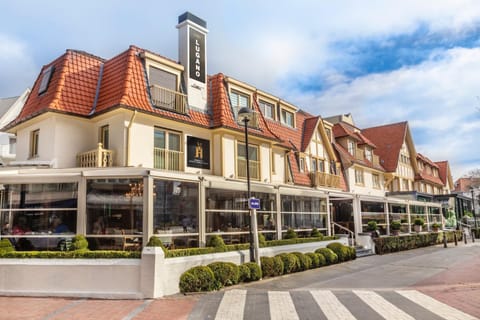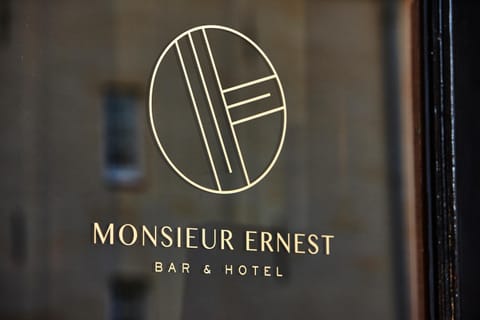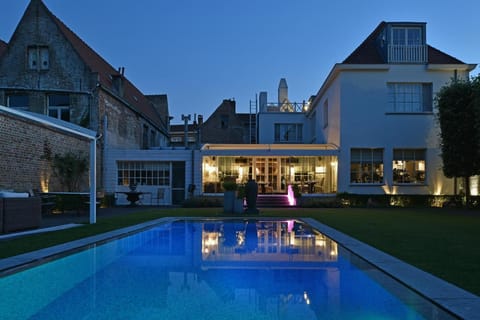Charming ecologic holiday home in Damme

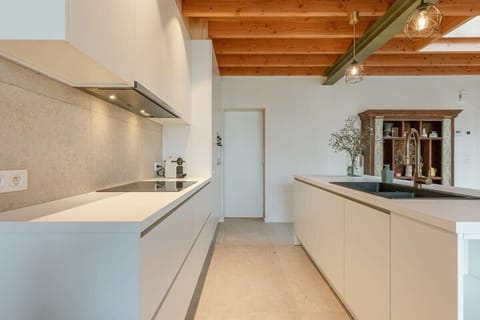
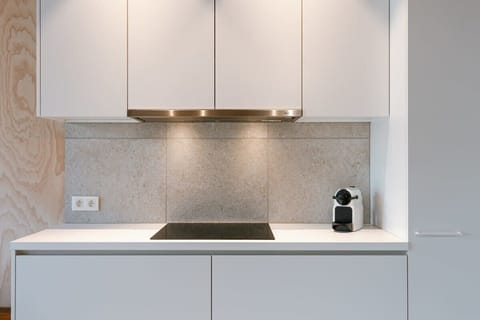
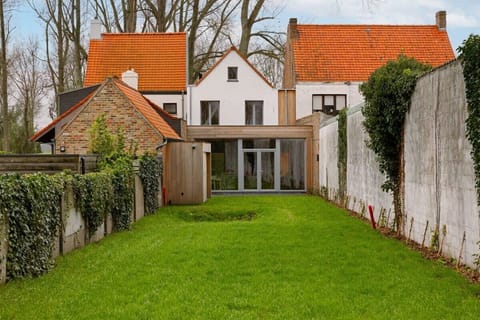
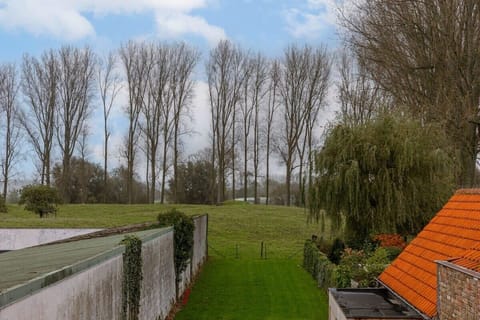
House in Bruges
10 guests · 3 bedrooms · 3 baths
Reasons to book
Includes essentialsKitchen or Kitchenette, Internet / Wifi, TV and more
Book with confidenceWe partner with the top travel sites so you know you're getting a great deal on the perfect rental
About this house rental
Summary:
Escape to a charming ecologic holiday home in Damme! This renovated vacation home offers an eco-friendly experience with a focus on ecological materials and techniques. Inside, you'll find a serene ambiance with a ground floor double bedroom and two spacious bedrooms upstairs, accommodating up to 10 guests in total. With 3 ensuite bathrooms, convenience is ensured. Located in the charming city of Damme and surrounded by natural beauty this retreat allows you to reconnect with nature.
The Space:
Escape to a Charming Ecologic Holiday Home! This vacation home in picturesque city of Damme was completely renovated in 2023 with 100% focus on ecological materials and techniques. We heat and cool our home with heat and coolness from the soil and surround them with wooden windows and walls behind which there is cellulose and cork as insulation, the remaining walls were finished with solvent-free paint. For the interior, we went snooping in the Eco-Shop and for the exterior, we landscaped our garden full of flower bulbs and insect-friendly plants with a central wadi that allows excess rainwater to seep back into the earth. Wondering if aquatic plants and frogs will find their way too.
Step inside and let the serene ambiance overwhelm you. On the ground floor, you'll find a beautiful bedroom with a comfortable double bed. Perfect for a couple seeking privacy and tranquility. Upstairs, you'll discover two more spacious bedrooms, each with the capacity to accommodate up to 4 guests. Equipped with a double bed and a mezzanine featuring two single beds, these rooms offer plenty of space for families or a group of friends. The mezzanine, accessible via stairs, adds a touch of adventure and creates a unique sleeping area.
No need to worry about bathroom queues here. With 3 bathrooms available, convenience is key. You'll find all the necessary amenities to pamper yourself and start each day feeling refreshed.
Surrounded by natural beauty, our holiday home is just a stone's throw away from breathtaking scenic views. Whether you want to explore the great outdoors or simply unwind in the private garden, this is the perfect retreat to reconnect with nature and enjoy culture at the same time.
Book your stay at our charming ecologic holiday home today and experience the perfect blend of comfort, sustainability, and tranquility. We can't wait to welcome you!
Guest Access:
We're excited to welcome you and make your stay as enjoyable as possible.
GUEST ACCOMMODATION ACCESS:
Guests have the entire accommodation to themselves.
EXTRA GUEST ACCOMMODATION ACCESS NOTES:
There are no other guest access notes that could impact your stay.
The Neighborhood:
Immerse yourself in the rich heritage of Damme, with its cobblestone streets, medieval buildings, and a tranquil canal that winds through the city. Explore the serene countryside with scenic bike rides, stroll along the lush greenery, and savor the fresh, crisp air. Damme's natural beauty invites you to unwind and reconnect with the world around you.
From active to gastronomic, from relaxed to lively: there is something for everyone here:
- Walking, cycling and horseback riding through the vast polder landscape
- Bruges: more than an open-air museum
- Boat trip on the Damse Vaart
- Strolling through the picturesque streets of Damme
- Getting a breath of fresh air at the Belgian coast
- Bird watching in Het Zwin nature park
A small 10min drive from Damme you can discover the ancient city of Bruges. Although the Bruges region was already inhabited in Roman times, the name of the city first appears in the 9th century, perhaps a derivation from the Old Germanic word 'brugj' or landing stage. Bruges therefore has a special relationship with the sea. After all, water played a crucial role in the development of the city. Here a number of streams converged to form a river (the Reie), which drained northwards into the coastal plain. This river was connected to the North Sea via so-called 'tidal channels', a guarantee for prosperity and prosperity.
Due to its favorable location and connection with the sea, Bruges developed early in the Middle Ages into an international and bustling trading city with a port. At the same time, the fortified fortress grew into a powerful political stronghold, thanks to the presence of the Flemish counts, who ruled the county of Flanders from Bruges. In the 13th century, Bruges could proudly call itself the most important trading center of Northwestern Europe. Traders from all over Europe settled in the city and the world's very first stock exchange was founded in Bruges. The exhibition activities took place on a square in front of the inn that belonged to the Van der Beurse family of estate agents in Bruges. In this way, their name was forever linked to the financial institution. Despite the typical medieval ailments, from epidemics to political unrest to social inequality, the inhabitants of Bruges were well off and soon the city acted as a magnet. Around 1340 the city had no fewer than 35 000 inhabitants.
The success continued and in the 15th century, Bruges' Golden Age, things were even better. Since the end of the 14th century, Flanders belonged to the realm of the Burgundian dukes. They further expanded their residence in Bruges and the city quickly became a cultural hotspot. In addition to the traditional cloth, plenty of new luxury products were produced and sold. Famous painters such as Jan van Eyck and Hans Memling – the great Flemish primitives – found their creative place here. The fine arts reigned supreme and in addition to numerous beautiful churches and unique nation houses, the monumental town hall was also completed. Bruges seemed unapproachable.
The sudden death of the beloved Queen Mary of Burgundy in 1482 heralded the turning point. The relationship between the inhabitants of Bruges and widower Maximilian of Austria soured and the Burgundian court left the city, with the international traders in its wake. Bruges' connection with the sea also quickly silted up. The Golden Age was over and long centuries of wars and power changes followed. After the independence of Belgium (1830) Bruges was a poor, impoverished city in the middle of the 19th century. Remarkably, a novel would help turn the tide.
In “Bruges la Morte” by Georges Rodenbach (1892), Bruges is aptly described as a somewhat dozed, but very mysterious place. The 35 photos included in the book for illustrative purposes in particular made readers curious. Bruges' magnificent patrimony was soon rediscovered and its mysterious intimacy immediately became its greatest asset. Bruges thus carefully took its first tentative steps towards tourism. The desire to be connected to the sea resulted in a new international seaport at the end of the 19th century, which was given the name 'Zeebrugge'.
During the First World War, Zeebrugge became a base for the German submarine fleet, controlled from the headquarters on the Brugse Markt. Both world wars left the historic city center virtually intact, which meant that Bruges' appeal continued to grow. And with success, because UNESCO promoted the entire medieval city center to World Heritage in 2000. The rest is history.
The Burgundians already knew. Bruges is the foodie destination par excellence. Good for a unique and very varied offer. From award-winning star restaurants and authentic brown bars to world-famous ice cream bars and hip lunch spots to original brunch addresses, chocolatiers and fancy cocktail bars. Bet you're running out of time? Because Bruges always tastes good.
Bruges is not just one of the gastronomic centers of Europe. Two renowned Bruges schools – Spermalie and Ter Groene Poorte – train culinary talent that is causing a furore internationally. The city is putting itself on the map with an impressive list of top restaurants. No fewer than 35 Bruges chefs receive a rating from Michelin, Gault & Millau and Bib Gourmand.
Bruges residents like to drink a pint and the 500-year-old Café Vlissinghe with hundreds of beers on stock is a good example of this. The city can therefore boast of a few beers, which are brewed locally. Right in the historic city center you can visit the De Halve Maan brewery and the Bourgogne des Flandres brewery. De Halve Maan is a family business with a tradition of six generations of brewers since 1856. Here, among other things, the Brugse Zot, the official city beer, is brewed with passion.
Bruges is easily reachable by car and train.
For more detailed information we refer to the websites “visitbruges” en “dekust”.
Getting Around:
ACCESSIBILITY:
You can easily reach the accommodation by car, public transport and taxi.
PUBLIC TRANSPORT:
For bus transport, please refer to the website “delijn”.
For train transport, please refer to the website “belgiantrain” or “nmbs”
For tram transport, please refer to the website “dekusttram” or “delijn”.
The Belgium coast is served by the Kusttram, which traverses the entire Belgian coast from Knokke to De Panne.
PARKING:
EXTRA GETTING AROUND NOTES:
There are no other getting around notes that could impact your stay.
Escape to a charming ecologic holiday home in Damme! This renovated vacation home offers an eco-friendly experience with a focus on ecological materials and techniques. Inside, you'll find a serene ambiance with a ground floor double bedroom and two spacious bedrooms upstairs, accommodating up to 10 guests in total. With 3 ensuite bathrooms, convenience is ensured. Located in the charming city of Damme and surrounded by natural beauty this retreat allows you to reconnect with nature.
The Space:
Escape to a Charming Ecologic Holiday Home! This vacation home in picturesque city of Damme was completely renovated in 2023 with 100% focus on ecological materials and techniques. We heat and cool our home with heat and coolness from the soil and surround them with wooden windows and walls behind which there is cellulose and cork as insulation, the remaining walls were finished with solvent-free paint. For the interior, we went snooping in the Eco-Shop and for the exterior, we landscaped our garden full of flower bulbs and insect-friendly plants with a central wadi that allows excess rainwater to seep back into the earth. Wondering if aquatic plants and frogs will find their way too.
Step inside and let the serene ambiance overwhelm you. On the ground floor, you'll find a beautiful bedroom with a comfortable double bed. Perfect for a couple seeking privacy and tranquility. Upstairs, you'll discover two more spacious bedrooms, each with the capacity to accommodate up to 4 guests. Equipped with a double bed and a mezzanine featuring two single beds, these rooms offer plenty of space for families or a group of friends. The mezzanine, accessible via stairs, adds a touch of adventure and creates a unique sleeping area.
No need to worry about bathroom queues here. With 3 bathrooms available, convenience is key. You'll find all the necessary amenities to pamper yourself and start each day feeling refreshed.
Surrounded by natural beauty, our holiday home is just a stone's throw away from breathtaking scenic views. Whether you want to explore the great outdoors or simply unwind in the private garden, this is the perfect retreat to reconnect with nature and enjoy culture at the same time.
Book your stay at our charming ecologic holiday home today and experience the perfect blend of comfort, sustainability, and tranquility. We can't wait to welcome you!
Guest Access:
We're excited to welcome you and make your stay as enjoyable as possible.
GUEST ACCOMMODATION ACCESS:
Guests have the entire accommodation to themselves.
EXTRA GUEST ACCOMMODATION ACCESS NOTES:
There are no other guest access notes that could impact your stay.
The Neighborhood:
Immerse yourself in the rich heritage of Damme, with its cobblestone streets, medieval buildings, and a tranquil canal that winds through the city. Explore the serene countryside with scenic bike rides, stroll along the lush greenery, and savor the fresh, crisp air. Damme's natural beauty invites you to unwind and reconnect with the world around you.
From active to gastronomic, from relaxed to lively: there is something for everyone here:
- Walking, cycling and horseback riding through the vast polder landscape
- Bruges: more than an open-air museum
- Boat trip on the Damse Vaart
- Strolling through the picturesque streets of Damme
- Getting a breath of fresh air at the Belgian coast
- Bird watching in Het Zwin nature park
A small 10min drive from Damme you can discover the ancient city of Bruges. Although the Bruges region was already inhabited in Roman times, the name of the city first appears in the 9th century, perhaps a derivation from the Old Germanic word 'brugj' or landing stage. Bruges therefore has a special relationship with the sea. After all, water played a crucial role in the development of the city. Here a number of streams converged to form a river (the Reie), which drained northwards into the coastal plain. This river was connected to the North Sea via so-called 'tidal channels', a guarantee for prosperity and prosperity.
Due to its favorable location and connection with the sea, Bruges developed early in the Middle Ages into an international and bustling trading city with a port. At the same time, the fortified fortress grew into a powerful political stronghold, thanks to the presence of the Flemish counts, who ruled the county of Flanders from Bruges. In the 13th century, Bruges could proudly call itself the most important trading center of Northwestern Europe. Traders from all over Europe settled in the city and the world's very first stock exchange was founded in Bruges. The exhibition activities took place on a square in front of the inn that belonged to the Van der Beurse family of estate agents in Bruges. In this way, their name was forever linked to the financial institution. Despite the typical medieval ailments, from epidemics to political unrest to social inequality, the inhabitants of Bruges were well off and soon the city acted as a magnet. Around 1340 the city had no fewer than 35 000 inhabitants.
The success continued and in the 15th century, Bruges' Golden Age, things were even better. Since the end of the 14th century, Flanders belonged to the realm of the Burgundian dukes. They further expanded their residence in Bruges and the city quickly became a cultural hotspot. In addition to the traditional cloth, plenty of new luxury products were produced and sold. Famous painters such as Jan van Eyck and Hans Memling – the great Flemish primitives – found their creative place here. The fine arts reigned supreme and in addition to numerous beautiful churches and unique nation houses, the monumental town hall was also completed. Bruges seemed unapproachable.
The sudden death of the beloved Queen Mary of Burgundy in 1482 heralded the turning point. The relationship between the inhabitants of Bruges and widower Maximilian of Austria soured and the Burgundian court left the city, with the international traders in its wake. Bruges' connection with the sea also quickly silted up. The Golden Age was over and long centuries of wars and power changes followed. After the independence of Belgium (1830) Bruges was a poor, impoverished city in the middle of the 19th century. Remarkably, a novel would help turn the tide.
In “Bruges la Morte” by Georges Rodenbach (1892), Bruges is aptly described as a somewhat dozed, but very mysterious place. The 35 photos included in the book for illustrative purposes in particular made readers curious. Bruges' magnificent patrimony was soon rediscovered and its mysterious intimacy immediately became its greatest asset. Bruges thus carefully took its first tentative steps towards tourism. The desire to be connected to the sea resulted in a new international seaport at the end of the 19th century, which was given the name 'Zeebrugge'.
During the First World War, Zeebrugge became a base for the German submarine fleet, controlled from the headquarters on the Brugse Markt. Both world wars left the historic city center virtually intact, which meant that Bruges' appeal continued to grow. And with success, because UNESCO promoted the entire medieval city center to World Heritage in 2000. The rest is history.
The Burgundians already knew. Bruges is the foodie destination par excellence. Good for a unique and very varied offer. From award-winning star restaurants and authentic brown bars to world-famous ice cream bars and hip lunch spots to original brunch addresses, chocolatiers and fancy cocktail bars. Bet you're running out of time? Because Bruges always tastes good.
Bruges is not just one of the gastronomic centers of Europe. Two renowned Bruges schools – Spermalie and Ter Groene Poorte – train culinary talent that is causing a furore internationally. The city is putting itself on the map with an impressive list of top restaurants. No fewer than 35 Bruges chefs receive a rating from Michelin, Gault & Millau and Bib Gourmand.
Bruges residents like to drink a pint and the 500-year-old Café Vlissinghe with hundreds of beers on stock is a good example of this. The city can therefore boast of a few beers, which are brewed locally. Right in the historic city center you can visit the De Halve Maan brewery and the Bourgogne des Flandres brewery. De Halve Maan is a family business with a tradition of six generations of brewers since 1856. Here, among other things, the Brugse Zot, the official city beer, is brewed with passion.
Bruges is easily reachable by car and train.
For more detailed information we refer to the websites “visitbruges” en “dekust”.
Getting Around:
ACCESSIBILITY:
You can easily reach the accommodation by car, public transport and taxi.
PUBLIC TRANSPORT:
For bus transport, please refer to the website “delijn”.
For train transport, please refer to the website “belgiantrain” or “nmbs”
For tram transport, please refer to the website “dekusttram” or “delijn”.
The Belgium coast is served by the Kusttram, which traverses the entire Belgian coast from Knokke to De Panne.
PARKING:
EXTRA GETTING AROUND NOTES:
There are no other getting around notes that could impact your stay.
Amenities
Kitchen or Kitchenette
Internet / Wifi
Laundry
Dishwasher
TV
Map of Bruges
FAQs
How much does this house cost compared to others in Bruges?
The average price for a rental in Bruges is £109 per night. This rental is £181 above the average.
Is parking included with this house?
Parking is not specified as an available amenity at Charming ecologic holiday home in Damme. For more information, we encourage you to contact the property about where to park.
Is there a pool at this house?
We didn’t find pool listed as an amenity for this house. It may be worth double checking if a pool is important for your stay.
Is Charming ecologic holiday home in Damme pet friendly?
Unfortunately, this house is not pet-friendly. Try searching again and filter for "Pets Allowed"
What amenities are available at Charming ecologic holiday home in Damme?
We found 5 amenities for this rental. This includes kitchen or kitchenette, internet / wifi, laundry, dishwasher, and tv.
Explore similar vacation rentals in Bruges
Explore all rentals in BrugesBruges travel inspiration
Read our blogGuides
Top Things to Do in Oahu and Honolulu
Guides
Top Things to Do in Fort Lauderdale, Florida
Guides
Top Things to Do in Miami: From Beaches to Culture
Guides
The Best Things to Do in Orlando: Attractions, Food, and Family Fun
Guides
Things to Do in Galveston, Texas
Guides
Top Things to Do in Myrtle Beach
Guides
Ski Trip Packing List: What to Bring Skiing or Snowboarding
Trends
VacationRenter Holiday Travel Trends 2023
